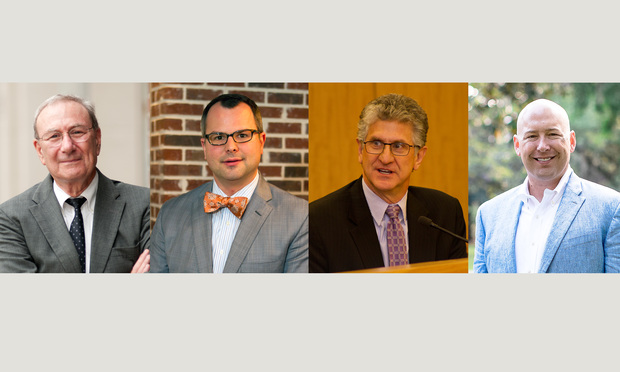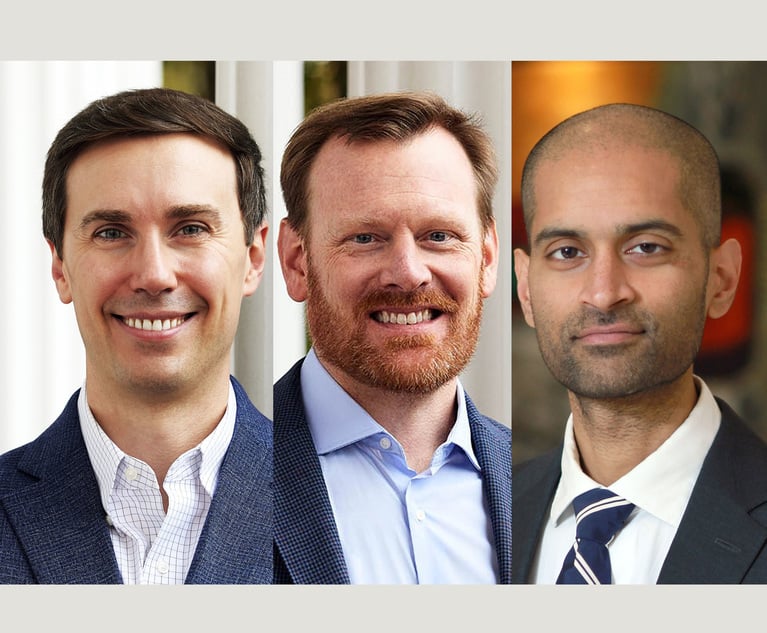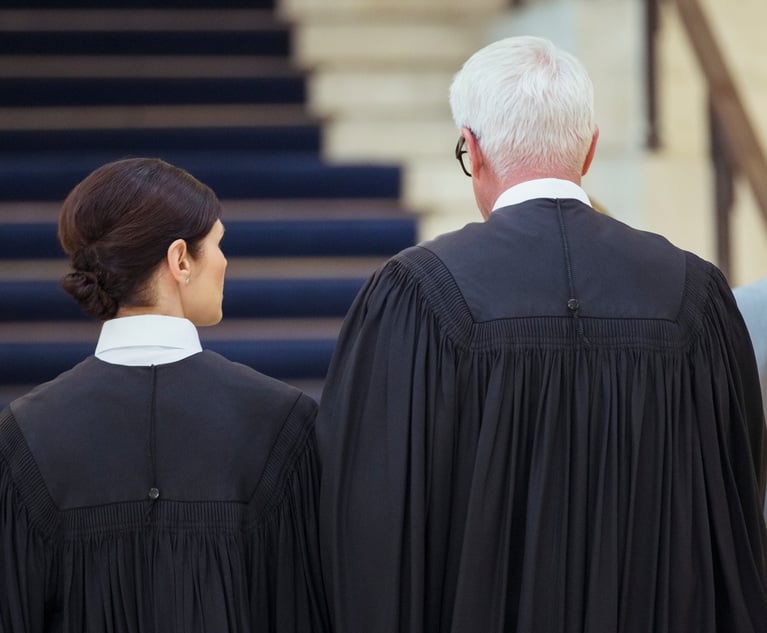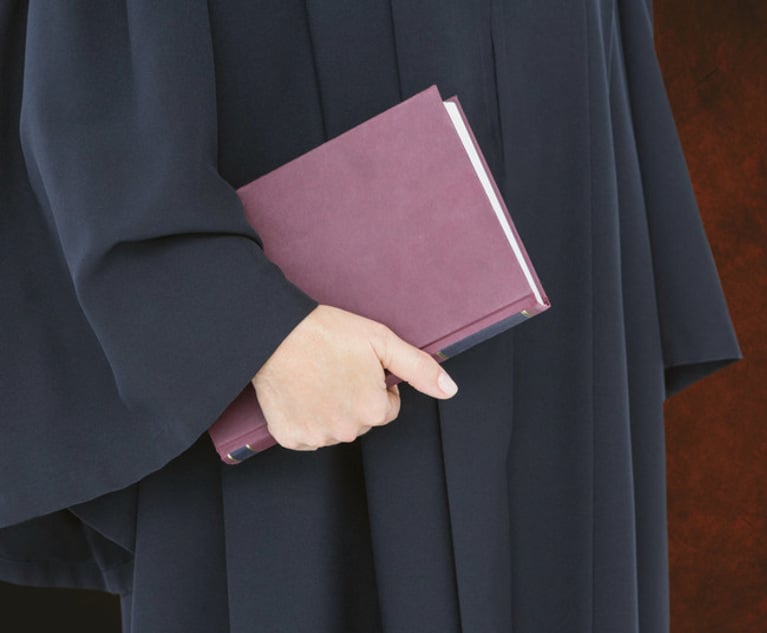Addressing COVID-19's Impact on Civil Legal Services
The indefinite delay of most in-person court sessions is a necessary action ... [b]ut it also substantially delays the delivery of justice, especially the civil legal needs of low-income Georgians and others suffering the economic fallout of COVID-19.
April 24, 2020 at 09:00 AM
5 minute read
 Steven Gottlieb (from left), Darrell Sutton, Richard "Rick" Rufolo and Paul Painter III. (Courtesy photos)
Steven Gottlieb (from left), Darrell Sutton, Richard "Rick" Rufolo and Paul Painter III. (Courtesy photos)
The COVID-19 pandemic has taken and continues to take an unprecedented public health and economic toll on our state. Most of the conditions are known all too well: the deaths of hundreds of our fellow Georgians and illness to thousands of others, devastating families and straining the capacity of our hospitals and other health care providers. With more than a million Georgia workers having filed for unemployment and state government facing a budget shortfall in the billions of dollars, the impact on the economy is like nothing we've seen in our lifetimes.
A less-obvious result of the pandemic—because, understandably, the public health and economic crises have been the focus to date—is its dramatic effect on Georgia's justice system. Last month, Chief Justice Harold Melton of the Supreme Court of Georgia declared a statewide judicial emergency, essentially grinding the wheels of justice to a temporary halt, except for matters critical or essential to protecting the "health, safety and liberty of individuals."
That declaration has been extended through May 13 and can be expected to remain in effect as long as other areas of government and the private sector are closed. The indefinite delay of most in-person court sessions is a necessary action to protect the health of citizens who are parties in those proceedings, as well as attorneys, judges, court staff and jurors. But it also substantially delays the delivery of justice, especially the civil legal needs of low-income Georgians and others suffering the economic fallout of COVID-19.
Unlike indigent defendants in criminal cases, citizens facing challenges in the civil justice system are not guaranteed representation in court. Those who cannot afford to hire their own lawyer must rely on legal aid organizations that are only partly funded by the government or attorneys who volunteer to take their cases on a free or reduced-fee basis.
In our state, the Atlanta Legal Aid Society offers free civil legal assistance to low-income people in Fulton, DeKalb, Cobb, Gwinnett and Clayton counties. For Georgia's other 154 counties, which are covered by only 30% of the state's attorneys, the Georgia Legal Services Program works to close the civil justice gap for low-income and senior-aged populations.
During normal times, these agencies each take on thousands of cases every month. New and unanticipated civil legal challenges brought on by COVID-19—including unemployment, housing and domestic abuse issues, to name a few—will see the demand for legal assistance swell in the weeks and months ahead.
Like the rest of the legal profession and much of the business world, Atlanta Legal Aid and Georgia Legal Services attorneys and staff are working remotely during the pandemic and are, for the most part, serving clients by phone and email. They need continued public support and help from the rest of us in Georgia's legal community like never before.
To address the situation, a task force among the State Bar of Georgia, Atlanta Legal Aid Society and Georgia Legal Services Program was formed to address issues related to the delivery of civil legal services for low-income Georgians that have arisen and continue to arise as a result of this pandemic. A special committee chaired by Savannah attorney Paul Painter III is fulfilling the State Bar's role in the task force.
The committee has reached out to lawyers across the state to identify these issues. The task force is coordinating with the appropriate judicial branch authorities, local and specialty bar associations and existing State Bar committees, sections and programs to quickly address and develop solutions to them.
But more will be needed. The task force will work with the Governor's office and General Assembly for their continued public support of civil legal services to enable an effective response to the ongoing pandemic and period of recovery ahead.
Contributions from private funders are just as important—if not more so. Georgia's lawyers this spring will have the annual opportunity to contribute to Georgia Legal Services Program via their license fee statements. And lawyers and laypeople alike can contribute to both Atlanta Legal Aid and Georgia Legal Services via their websites at www.atlantalegalaid.org and www.glsp.org, respectively.
Substantial and sustained support for civil legal aid is essential to our state's response to COVID-19. We already see the need, and we know so much more is coming. Increased support from the public and private sector is the only way Georgia's legal services providers can meet this need and help guide Georgians through their recovery.
Darrell Sutton is president of the State Bar of Georgia. Rick Rufolo is executive director of the Georgia Legal Services Program. Steve Gottlieb is executive director of the Atlanta Legal Aid Society. Paul Painter III is chair of the State Bar of Georgia COVID-19 Response Committee.
This content has been archived. It is available through our partners, LexisNexis® and Bloomberg Law.
To view this content, please continue to their sites.
Not a Lexis Subscriber?
Subscribe Now
Not a Bloomberg Law Subscriber?
Subscribe Now
NOT FOR REPRINT
© 2025 ALM Global, LLC, All Rights Reserved. Request academic re-use from www.copyright.com. All other uses, submit a request to [email protected]. For more information visit Asset & Logo Licensing.
You Might Like
View All
Spalding Jurors Return $12M Verdict Against State Farm Insurance Client
10 minute read

Trending Stories
- 1State Budget Proposal Includes More Money for Courts—for Now
- 2$5 Million Settlement Reached With Stone Academy
- 3$15K Family Vacation Turned 'Colossal Nightmare': Lawsuit Filed Against Vail Ski Resorts
- 4Prepare Your Entries! The California Legal Awards Have a New, February Deadline
- 5DOJ Files Antitrust Suit to Block Amex GBT's Acquisition of Competitor
Who Got The Work
Michael G. Bongiorno, Andrew Scott Dulberg and Elizabeth E. Driscoll from Wilmer Cutler Pickering Hale and Dorr have stepped in to represent Symbotic Inc., an A.I.-enabled technology platform that focuses on increasing supply chain efficiency, and other defendants in a pending shareholder derivative lawsuit. The case, filed Oct. 2 in Massachusetts District Court by the Brown Law Firm on behalf of Stephen Austen, accuses certain officers and directors of misleading investors in regard to Symbotic's potential for margin growth by failing to disclose that the company was not equipped to timely deploy its systems or manage expenses through project delays. The case, assigned to U.S. District Judge Nathaniel M. Gorton, is 1:24-cv-12522, Austen v. Cohen et al.
Who Got The Work
Edmund Polubinski and Marie Killmond of Davis Polk & Wardwell have entered appearances for data platform software development company MongoDB and other defendants in a pending shareholder derivative lawsuit. The action, filed Oct. 7 in New York Southern District Court by the Brown Law Firm, accuses the company's directors and/or officers of falsely expressing confidence in the company’s restructuring of its sales incentive plan and downplaying the severity of decreases in its upfront commitments. The case is 1:24-cv-07594, Roy v. Ittycheria et al.
Who Got The Work
Amy O. Bruchs and Kurt F. Ellison of Michael Best & Friedrich have entered appearances for Epic Systems Corp. in a pending employment discrimination lawsuit. The suit was filed Sept. 7 in Wisconsin Western District Court by Levine Eisberner LLC and Siri & Glimstad on behalf of a project manager who claims that he was wrongfully terminated after applying for a religious exemption to the defendant's COVID-19 vaccine mandate. The case, assigned to U.S. Magistrate Judge Anita Marie Boor, is 3:24-cv-00630, Secker, Nathan v. Epic Systems Corporation.
Who Got The Work
David X. Sullivan, Thomas J. Finn and Gregory A. Hall from McCarter & English have entered appearances for Sunrun Installation Services in a pending civil rights lawsuit. The complaint was filed Sept. 4 in Connecticut District Court by attorney Robert M. Berke on behalf of former employee George Edward Steins, who was arrested and charged with employing an unregistered home improvement salesperson. The complaint alleges that had Sunrun informed the Connecticut Department of Consumer Protection that the plaintiff's employment had ended in 2017 and that he no longer held Sunrun's home improvement contractor license, he would not have been hit with charges, which were dismissed in May 2024. The case, assigned to U.S. District Judge Jeffrey A. Meyer, is 3:24-cv-01423, Steins v. Sunrun, Inc. et al.
Who Got The Work
Greenberg Traurig shareholder Joshua L. Raskin has entered an appearance for boohoo.com UK Ltd. in a pending patent infringement lawsuit. The suit, filed Sept. 3 in Texas Eastern District Court by Rozier Hardt McDonough on behalf of Alto Dynamics, asserts five patents related to an online shopping platform. The case, assigned to U.S. District Judge Rodney Gilstrap, is 2:24-cv-00719, Alto Dynamics, LLC v. boohoo.com UK Limited.
Featured Firms
Law Offices of Gary Martin Hays & Associates, P.C.
(470) 294-1674
Law Offices of Mark E. Salomone
(857) 444-6468
Smith & Hassler
(713) 739-1250







